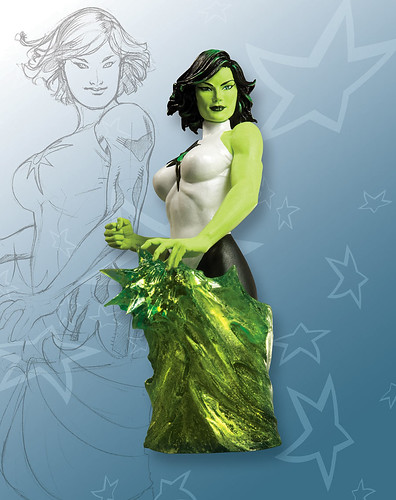Over at my
post about Barbie dolls, commenter Mark Engblom had a comment that I thought deserved more interest.
I wonder why the possibility of crazily-muscled male action figures warping a boy's body image is never talked about.
My response in the thread was:
Interestingly, Mark, I see that sort of thing talked about all the time. Oddly enough, it always seems to be in response to a genuine criticism to something with a debatably harmful portrayal of women, seemingly as a reason to dismiss said criticism.
Now why it doesn't seem to ever be brought up as its own issue, well, I wouldn't begin to try to conjecture.
I stand by this response, because I do think the question comes up more genuinely as an attempt (albeit probably a subconscious one) to silence any sort of discussion about potentially harmful portrayals of women. I doubt it's malicious, but it's a fairly obvious attempt to silence because if you think about it logically, this conclusion results: "Okay, so this portrayal of women may be harming women and this portrayal of men may be harming men, so we should change them both!"
And yet, somehow this obvious conclusion is never mentioned by anyone who brings up the male perspective. In fact, it seems to be brought up with a tone of "What about the men?" with an added dose of "Well, it hurts both of us so quit your bitching."
I am perhaps not being fair to Mark here. I don't mean to single this out as his motive. I'm no mind-reader after all. I think it's an innocent question...at least on a subconscious level, as it is for most men (it's usually men who ask this for some reason), but I also think, and again this is probably unfair but it's the impression I get, that guys like Mark are rather bored or have heard enough of complaints by women about this subject and would be perfectly happy to never talk about it again.
Too bad. I'm not going to stop talking about something I see as a genuine problem because some people are bored of hearing the complaints. You want me to stop boring you with complaints? Help fix it. Otherwise, suck it up.
I'm not going to deny that the generically overmuscled physical archetype that we see in superhero comics and the media and in GI Joes, action figures, Ken dolls and the like probably do harm men. I don't have access to any sort of statistic, but I've seen the effects of steroid abuse and I've known men who've had eating disorders and body image issues, men who are plastic surgery addicts too. While I don't think the toys and superheroes are directly the problem, I do think they, like Barbies and the girl superheroines, are symptomatic of a greater problem and worth examining and yes, if it comes down to it, even changing.
I think there are a number of factors as to why there are more complaints about the harm to women than to men. You can decide yourself if they're valid, or just excuses. Personally, I think they're somewhat valid though and worth considering.
1) The men are an idealization of strength, the women of "sexiness".This is a reason seen often on feminist sites so I won't bore you by harping on it. I think there's some element of truth in it, of course. The men are seen more as idealized self-images, the women as a man's idealization of woman. There's a small but subtle difference there. The men are portrayed as an idealization by their own terms, women by how desirable they are to men. You're a lot more likely to see ugly male heroes than you are ugly female heroes after all.
I tend to think 1) is something of a smokescreen though for a deeper reason:
2) Both the images of men and the images of women in the media are by and large chosen and promoted by men.This is true for sure with regards to superhero comics. But even in completely female-oriented fields like Romance novels, which are by and large written by women, the publishers and editors, the folk who choose what books get released, are men. There are female authors who have been told point blank by male producers that "that won't sell to women," which, if you think about it, is fairly ridiculous. Sure, not every woman is going to come up with awesome ideas and some will bomb and the romance novel industry at the hands of these men does fairly well, but what it comes down to is we still have men determining what kind of male images are being created for female consumption.
Barbie is a little different. Barbie was created by a woman during a time when the head of Mattel was also a woman. This is truth. However, Mattel was created by a man and I think that if you look at the stockholders and CEOs of that time, you're going to see a lot more men than you will women. If you look at the current leadership team of Mattel,
there are a lot more men on it than women. And it's still working in a media society that was first and foremost created by rich white men.
And of course, these companies are going to go with what sells. However, we're working with a weighted deck. Who originally tried these methods that work? Those old rich white men. Why did they choose these particular methods? Probably, they made the most sense given the perspective of those men and society at the time. Would other methods work? Who knows. What if we try something new and it doesn't work?
But that's not the right question. The question is "who decides the consequences if it doesn't work?" The question is "How long of a chance do you give these new methods?" I mean, think about it, customers are used to things a certain way. Something new is going to spook them at first. So how long do you give them to get used to it? And more importantly, who makes that decision?
It's perhaps not surprising then that most companies stick to the status quo as created by these men. The Ferris University's Jim Crow Museum
site is a marvelous site looking at the prevalence of racial stereotypes in the media through the Jim Crow era into the modern day. It deals with racism, not sexism, or rather, it deals with sexism but through racism, specifically added burdens suffered by black women throughout history, but even if the focus isn't quite the same, the perspective is still remarkably useful when examining the perpetuating harmful media stereotypes and where and how they continue.
Think about it this way. Remember the kerfluffle earlier where a CEO apparently claimed they were going to stop making action movies with female leads because Elektra, Catwoman, the Brave One, et al, bombed? Whether that was true or not, it's a scarily plausible scenario. We know those kind of decisions get made all the time.
But really, the movie making industry is billion-dollar, and if you look at all the action movies that bomb, I'm fairly certain you're going to find a lot more fronted by men than by women. (How many horrible Rocky or Rambo movies are there?) But no one would ever believe a company saying that they're going to stop making action movies starring men, right?
Let's not even get into how we might see Bruce Willis or Sly Stallone even now leading an action movie, but the closest equivalent to a woman of similar age in an equivalent "return of" role is possibly Sigorney Weaver. According to IMDB, Ms. Weaver was born in 1949 and thus she would have been 48 in Alien Resurrection, starring opposite young and cute and innocent Winona Ryder. Bruce Willis was 52 in Die Hard, and Sylvester Stallone will be 64 in time for Rambo. I think Ms. Weaver's pretty much the exception that proves the rule however. It's very hard to find women of comparative age leading an action movie unless we're talking about Demi Moore in Charlie's Angels 2. And most of the press surrounding that had to do with how good she looked for her age and how she was banging a 25 year old.
Even having more women in CEO and shareholder positions is only a baby step toward finally equalizing the media influence, since ultimately these women have had to grow up in the industry created by men and have had to play by the rules of men. They play well and are now in a position to get things done, but how have all those years affected their own perspective? The shadows of their colleagues and predecessors are still very palpable.
Ultimately, I'm digressing. I think the point however is that there's a difference between a harmful portrayal that is self-inflicted and one that is inflicted on you. Both are bad and both ought to be changed but it's a lot harder to genuinely play the martyr. Yes, I'll believe that Superman, Ken and GI Joe can cause harmful body issues for men, but considering that men are running DC, Mattel and the like right now, there's nothing stopping you from changing it.
3) Arnold Schwarzenegger is less scary than Karen Carpenter.This is rather tied into the strength vs. sexiness argument. But not completely.
See, okay, I'm more than willing to acknowledge that the body image issues reflected/projected by GI-Joe and Superman and company are harmful. I can buy that the media promotes steroid use and plastic surgery and eating disorders for men.
But lets look at the token representative for each side of this issue.
Arnold Schwarzenegger is kind of the poster child for 80s action scary steroid use. He is, at least, the first name that pops into my mind of someone who probably has used steroids. (I don't know if it's been proven, to be fair.) This is of course how we remember him:

(Swiped and re-uploaded from
here)
He looks strong and tough and a little scary. I don't want to think about the long term effects those drugs and his exercise regime probably had on his body. I don't want to think about the pain he must have now. I certainly don't want to think about how many men died or suffered horrible damage from steroid use.
But I don't have to. Because this is how I remember Arnold Schwarzenegger when I think about Arnold the poster child for probable steroid use. If I think of him now, it's as:

(Swiped from
here)
This guy. Politician, governor. Whatever health issues he has now are easy to ignore. He looks fine, healthy.
---
Karen Carpenter is one of the first names anyone thinks of when they think of eating disorders. I know she's how my mother explained anorexia to me. A beautiful singer, beautiful voice. Amazing and talented lady. But how do we remember her?

(swiped from
here)
It's weird how horrible and ghoulish I feel posting that. I felt worse seeking out the image. How do you think to yourself "I need an image of this poor woman just before she died" and not feel just a little monstrous. This not the image that I remember my mother showing me in a tabloid, but it's bad enough.
That poor woman.
It's a scary image. It's tragic and horrifying and it's not something we can brush away or ignore because this woman is a politician in California now. This woman isn't a politician in California. This woman is dead. And so are so many other girls who've followed in her footsteps.
I'm not saying that anorexia is worse than steroid abuse. I'm not even saying that more girls die from anorexia than boys do from steroid abuse. I don't know about any of that. I'm not about to compare the long term physical effects.
I'm saying that the first name that comes to mind whenever anyone mentions the possible harmful effects of GI-Joe and Superman is alive and well and a successful politician. The first name that comes to mind whenever anyone mentions Barbie is not.
It's possible that other people thinking of this issue think of a tragically dead bodybuilder and Tracey Gold and it's different. But I think enough people share my blindspot that it becomes easier to see the harm one way than in the opposite. So we're going to talk about the issue from that side more.
This is wrong and unfair, of course. But the cure isn't to stop talking about Barbie and Supergirl and the like, it's to keep talking about them AND about Superman and GI-Joe so that the problem is real and palpable to both sides. So that we can change things for everyone.
4. Girls and Boys tend to look at numbers differently.Over at his blog, Mad Thinker Scott examines
Karen Healey's examination of heights and weights as provided by Marvel editorial staff.
Scott makes some good points in examining both sexes and likely factors, but there's one thing that stuck in my mind the first time I read his entry:
I’m assuming that straight men are like gay men, in that we know what we like when we see it, but we don’t know how much it actually weighs. I know guys who like heavy guys, skinny guys, body builder types, etc., but I have never heard even one use a number in relation to the weight of the guys he likes. Never. I couldn’t tell you much any of the guys I’ve found attractive weigh. Because I don’t believe that guys tend to have an ideal weight with an actual number attached to it, I suspect that Karen is engaging in a little projection; i.e., she knows women tend to have ideal weights in mind for themselves that they think will make them the most attractive and that those weights tend to be lower than what doctors would suggest is their ideal weights for good health, so she assumes that men also have ideal weights in mind for women. Multiple studies have confirmed that women think about weight more than men and that women are more likely to have targeted ideal weights for themselves than men do. It doesn’t surprise me to find that Karen appears to think that the weights associated with the Marvel characters are associated with ideal weights while I think they have more to do with men being relatively oblivious to what women weigh. I’m assuming straight men think more like gay men, and she’s assuming they think more like women. (And of course, I think I’m right!)
I think Scott's right. I don't think the Marvel editors really know how much 5'10" and 120 pounds looks/weighs on a woman. I think they're guessing. Maybe they're using supermodel weights. Maybe their wives/daughters lie about their numbers. Maybe they do know women with those sizes (though I sincerely doubt it because in general, those proportions don't manifest in that body type).
But that's not much of a comfort to me.
See, I know what those numbers tend to look like. Moreover, I know my own numbers. I know the numbers of most of my friends. I know the numbers of my mother and grandmother. Most men, I think, don't know or focus on numbers as much unless they have a particular reason (i.e. weight requirements for a job/sports team/et al) but when you're a woman, I think it's hard to ignore.
I know that I'm four inches shorter than Felicia Hardy and twenty-five pounds heavier. By numbers, that makes me 5'6" and 145 lbs. I appreciate that to most guys, that's just a number. Sadly the best picture I have of me is
here. I don't know if you can see much of my actual body type/build, but there you go. You can see the comedically large foot I'm using to annoy the dog. I love my comedically large feet.
I'm not posting this picture looking for compliments or comfort or reassurance. I'm usually perfectly happy with my height, weight and build. I think I tend to look thinner than I am, which I do like. I'm a little vain in that respect.
But I have a confession to make. And it's a stupid doozy of one. But see, I didn't know how much I weighed until I went to the clinic last week. And when I saw the weight settle on 145...I found my brain mentally comparing every height and weight statistic I knew. And yes, that includes comic book characters. And during that mild freak-out, the unrealistic stupid
guessing numbers started to drown out the real ones.
God, I have never wanted to slap myself so hard.
Fortunately I came to my senses. I've always had a fairly sturdy self-image, I like how I look now, and really, I don't think I'd be too bothered about being heavier (though buying new clothes would be annoying.) As long as I don't think about the numbers.
Because it really is the numbers that count. Many people with anorexia or bulimia focus on the numbers. See, it's about control for a lot of people. And there's the idea that if the suffering person can reach that target weight, then things will be better. It's not a magic thing. Not a "if I can reach 115 lbs, my life will magically change." It's more a "if I can drop this weight, then it means that I
can control myself. This won't beat me." Of course, in the end, it's the illness in control. The numbers change, decrease. The goals get more extreme. Perspectives distort and failure takes on new meanings. And victory doesn't help, because in the end it doesn't change anything. It just drives you to push harder.
Until you die.
It's why sometimes, I think, we overreact or go to such extremes about this issue. It's a scary issue. Because these diseases don't start as some full blown compulsion to just stop eating or throw up food. They're control disorders first and foremost, and as such, they're subtle and insidious. They start out small and reasonable. "Well, if I can just drop five pounds, I'll look better and feel healthier." It's hard to argue with that. And for many people it stops there. But then there are some who, energized by the triumph, decide to go farther. "Well, you know, if I drop two more dress sizes, I can borrow Sandy's blue dress!" Again, fairly innocent. "...wouldn't it be nice if Sandy's dress was even a little
too big for me?" Then... "I'm just a little over x lbs. If I can just lose a little more, then I'll stop."
And so on and so forth. And each step is so small, it seems so reasonable. And it doesn't stop. And failure is crushing. Since you can't really win the game, you can only define yourself by your failures.
I don't think it's really about being thin, or rather, that's how it starts, but it's really about something you can measure. But at the very least, the images from the media, the lessons from society are helping things along, giving the compulsion a focus.
And people die.
We might not be able to completely fix the problem, but we can at least get rid of some of the factors that make things so much worse.
It's a really complex issue. All of this is. I do think, however, that we should be talking about it. We should keep talking about whether Barbie or Supergirl projects a negative body image and we should be talking about whether Superman and GI-Joe do too. Because really, just because you're NOT complaining doesn't mean that a problem isn't there.
And closing your eyes and plugging your ears won't make a possible problem go away, it just makes you look silly. Complain. Discuss. Help FIX it.
Or get out of the way.






